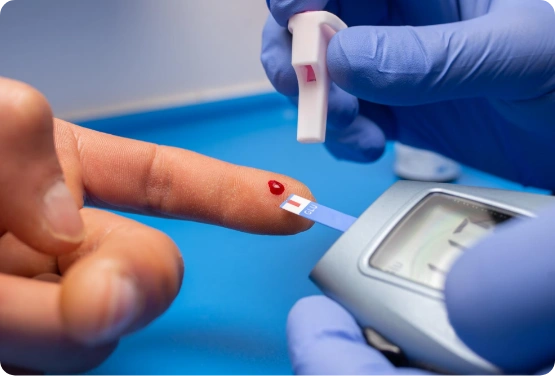Diabetes Treatment in Manhattan, NY
Expert Care at Manhattan Medical Arts
Comprehensive Diabetes Care by Dr. Syra Hanif at
Manhattan Medical Arts
At Manhattan Medical Arts, we provide comprehensive, patient-centered diabetes treatment to help you effectively manage blood sugar levels, prevent complications, and improve your overall health. Led by Dr. Syra Hanif, our team offers cutting-edge treatments, personalized care plans, and advanced diabetes management solutions for Type 1 Diabetes, Type 2 Diabetes, Prediabetes, and Gestational Diabetes. If you’re searching for an endocrinologist near me or a diabetes doctor near me, look no further than our expert team in New York City. We are also a premier diabetes center near me, offering specialized care for all diabetes-related conditions.
What Is Diabetes?
Diabetes is a chronic metabolic condition that affects the body’s ability to process blood glucose (sugar). If left untreated, it can lead to serious complications such as heart disease, kidney disease, nerve damage, and vision problems. Finding a diabetic doctor or a diabetes specialist near you can be crucial for early intervention and management. Looking for a cure for diabetes? Our team provides advanced treatments to effectively manage and control diabetes.
Types of Diabetes We Treat
Type 1 Diabetes
An autoimmune condition where the body stops producing insulin. Patients require insulin therapy and blood sugar monitoring. Our endocrinologists in New York City specialize in managing Type 1 Diabetes.
Type 2 Diabetes
A condition where the body develops insulin resistance and struggles to regulate blood glucose levels. Treatment includes diabetes medications, insulin therapy, and lifestyle changes. Looking for the best Type 2 diabetes treatment in NYC? Our diabetes center near you offers comprehensive care.




Prediabetes
A warning stage where blood sugar levels are elevated but not yet classified as diabetes. Early intervention can prevent Type 2 Diabetes. Consult a diabetes doctor NYC to take control of prediabetes effectively.
Gestational Diabetes
A condition affecting pregnant women, leading to high blood sugar levels. It requires specialized monitoring to protect both mother and baby. Our endocrinologists in Manhattan provide specialized care for gestational diabetes.
Our Diabetes
Treatment Approach
At Manhattan Medical Arts, we provide a multidisciplinary approach to diabetes care, integrating advanced medical treatments, nutrition counseling, and lifestyle coaching to help you manage blood sugar levels and prevent complications. Whether you’re looking for a diabetic specialist near me or an endocrinologist NYC, we offer personalized care plans.
Personalized Diabetes Treatment Plans
Our specialists create individualized treatment plans based on your blood glucose levels, body weight, medical history, and lifestyle. Searching for a diabetes treatment near me? Our expert endocrinologists in New York City provide customized plans tailored to your needs. If you’re searching for endocrinology near me, our team of specialists is here to provide comprehensive diabetes care.
Blood Sugar Monitoring & Diagnostic Tests
Random Blood Sugar Test
A quick test to check current blood glucose levels.
Fasting Blood Sugar Test
Measures blood sugar after overnight fasting.
Glycated Hemoglobin Test (HbA1c)
Averages blood sugar levels over 3 months.
Continuous Glucose Monitoring (CGM)
Tracks blood sugar in real time.
Insulin Therapy &
Diabetes Medications
Insulin Therapy
Includes insulin injections, insulin pumps, and automated insulin delivery systems.
Diabetes Medications
We prescribe oral medicines, receptor agonists, and glucose-lowering medications to regulate blood sugar effectively.
Nutrition & Meal Planning For Diabetes
Healthy Diet & Meal Planning
- Our team provides customized dietary advice to help you maintain a healthy weight and stable blood sugar levels. Looking for the best endocrinologist in NYC to guide you on nutrition and diabetes management? We’ve got you covered.
Physical Activity & Weight Management
Staying Physically Active
Regular exercise helps lower blood glucose levels and improves insulin sensitivity.
Weight Management Programs
We offer medically supervised weight loss programs to support diabetes control.
(Learn More)
Why Choose Manhattan Medical Arts
for Diabetes Care?

Expert Diabetes
Specialist
Led by Dr. Syra Hanif, an experienced diabetes physician providing comprehensive, compassionate care. Our center is recognized as a leading endocrinologist in Manhattan, offering specialized care for all diabetes-related conditions.

Personalized Diabetes Management
Customized treatment plans, meal guidance, and medication adjustments.

Advanced Diabetes
Monitoring
Offering CGM, insulin pumps, and blood sugar management tools.

Convenient Locations & Telemedicine
Visit us in Manhattan &
Forest Hills or schedule an online consultation.

Insurance &
Flexible Payment
Options Available
Book an Appointment with a
Diabetes Specialist Today
Take control of your diabetes with expert care at Manhattan Medical Arts. Whether you need diabetes management, blood sugar monitoring, insulin therapy, or lifestyle counseling, we are here to help. Searching for the best diabetes doctor NYC, an endocrinologist near me, or an endocrinologist in New York City? Book your consultation today.
Frequently Asked Questions
What are the early signs of diabetes?
Early signs include frequent urination, excessive thirst, fatigue, blurred vision, slow wound healing, and tingling in hands/feet. If you notice these symptoms, consult a diabetes doctor near me immediately.
How do I test for diabetes?
We offer fasting blood sugar tests, glycated hemoglobin (HbA1c) tests, and glucose tolerance tests to diagnose diabetes. (Schedule a Test)
What is the best diet for diabetes?
A diabetes-friendly diet should include whole grains, lean proteins, non-starchy vegetables, and healthy fats. Avoid processed sugars, excessive carbs, and high-calorie foods. Consult a diabetic specialist near me for personalized meal plans.
Latest Blog Posts
Making primary care accessible









